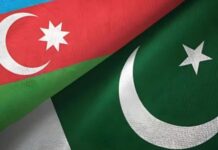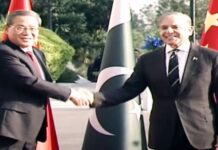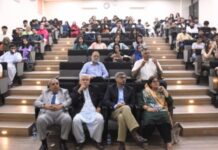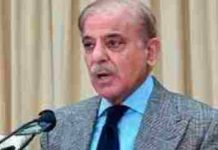ISLAMABAD, Oct 03 (NNI): The International Monetary Fund (IMF) Mission Director for Pakistan Nathan Porter has said that the recent bailout package secured by Pakistan might be the last one if the reforms suggested by the lender are sincerely implemented and its advice is acted upon in letter and spirit.
In an exclusive interview with US media outlet, The Voice of America, the IMF Pakistan Mission Director said that the lender would ensure Islamabad retained a strong macro exchange rate and fiscal and monetary policies along with liberalising its economy enabling the private sector to contribute to the country’s economic development.
The IMF official said that during the previous programme, inflation was high the current account deficit was also high and during this time there was almost ‘no economic growth’.
“We were able to stabilize the situation with subsidies, concessions make businesses ineffective,” the IMF mission chief said. “This reduces growth prospects,” the IMF mission head said.
Nathan Porter has emphasized the importance of sustainable economic growth without the need for excessive incentives or concessions.
At a recent event, Porter reiterated the IMF’s support for both domestic and foreign investments, stating that the government’s role should primarily focus on providing necessary infrastructure and preparing a skilled labor force for businesses.
Reflecting on Pakistan’s economic progress, Porter acknowledged the significant economic stability achieved over the last 12 months, despite facing volatility and uncertainty in mid-2023. “The change has occurred very quickly, and this provides a good foundation for moving forward,” he noted.
Ever since, Pakistan has received the first tranche of $1.03 billion (SDR 760 million) pushing the foreign exchange reserves, as per the publication, to $10.7 billion. The incumbent government has, time and again, expressed that it wants the existing bailout programme to be the country’s last.
The IMF official elaborated on the country’s 24th loan programme and said that the first review of the ongoing debt programme would start in December and probably by March or April it would be sent to the board.
The government and some economic experts have stated that the IMF imposed strict conditions on the country for the current programme. Finance Minister Muhammad Aurangzeb had also stated that owing to the trust deficit, the IMF had put strict conditions on Islamabad for the debt programme.
Porter, however, disagreed with such claims and said the IMF considered issues of the country whenever it came up with a programme for any country and recommended their solutions. He said the programme for Pakistan was devised in a similar manner and it was not very strict.
He recalled that when the IMF initiated its last programme, inflation was very high in Pakistan along with a high deficit in the current account. He said no economic progress was happening and the programme intended to stabilise the country’s economy and be successful.
Regarding the Chinese loans to Pakistan, he said Beijing was a major Islamabad and was not different from its stance on the loans of other countries.
The lender has also called for steps for the country’s agricultural sector. with reports saying that the IMF’s recommendations include ending the support price system for food and subsidies on agriculture.
Commenting on this, the Fund’s mission director explained that there was evidence that the support price benefitted wealthy and big farmers but small farmers actually faced difficulties due to it.
He said such schemes resulted in a debt increase that was to be borne by the provinces and last year, the support price scheme actually caused an increase in the flour price.
To a question about the economic burden on the people of Pakistan as a result of adopting the IMF policies, the mission director said Pakistan needed to make its tax system effective and fair, for which steps had been taken in this year’s budget.
He said if the agriculture system and retail and property businesses paid taxes, it would decrease the burden on the common people and the country would have funds to spend on their welfare.
Discussing less foreign investment in Pakistan, Porter said unnecessary government intervention in businesses had been hampering foreign investment.
He remarked that Pakistan was a major market and potentially a large labour force but sometimes it was not considered an attractive destination for investment.
He was of the view that some basic steps were required to improve investment in the country such as minimal involvement of the government in the businesses and reviewing the government’s powers in implementing tariffs and prices.
In addition to them, he called for reforms in government institutions, privatisation of some of them and taking steps to decrease the cost of power generation to boost investments.
For some days, the media has been reporting the government’s decision to not set up more special economic zones that were earlier established for providing subsidies and concessions to industries and businesses. The IMF, however, does not consider offering such incentives helpful for meeting economic targets.
He opined that subsidies and concessions weakened businesses and lessened the prospects of growth.
He said the government’s job was to just provide the basic skeleton for the businesses. The IMF would soon release a detailed report in this regard. NNI








































